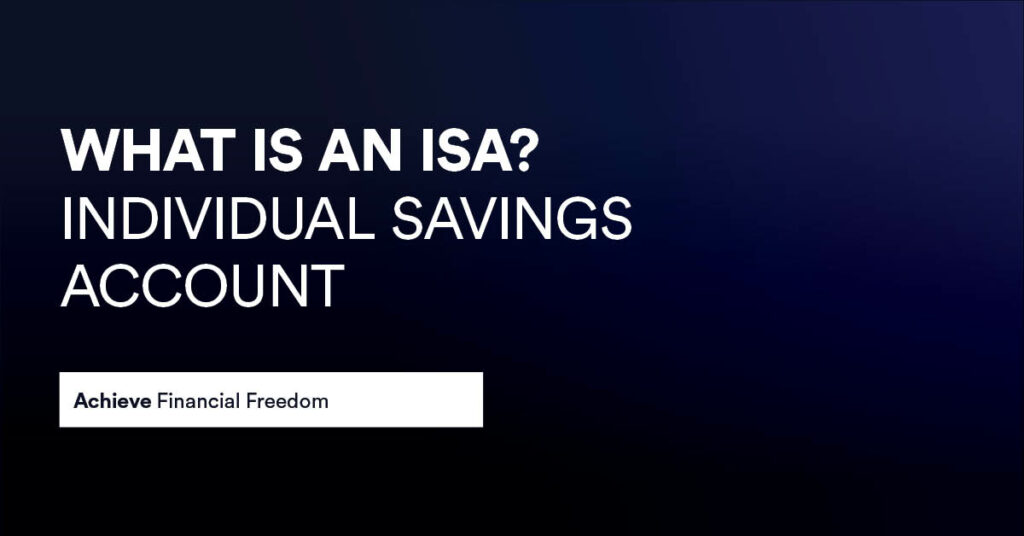An Individual Savings Account or as it is commonly abbreviated to “ISA”, is a type of tax-advantaged savings and investment account available to residents of the United Kingdom. ISAs were introduced by the UK government in 1999 to encourage saving and investing among individuals.
The main advantage of an ISA is that any interest, dividends, or capital gains earned within the account are tax-free, allowing your money to grow more efficiently over time. Unlike your pension contributions, the money put into an ISA is from your post-tax income.
Types of Individual Savings Accounts
There are 4 main types of ISA available for adults in the UK. These include:
- Cash ISA: A savings account where you can deposit cash, earn interest on your savings, and withdraw money without incurring any tax liabilities. Cash ISAs can be offered by banks, building societies, and other financial institutions.
- Stocks and Shares ISA: This type of ISA allows you to invest in various financial instruments, such as stocks, bonds, and investment funds. Any returns generated from these investments, such as capital gains or dividends, are tax-free.
- Innovative Finance ISA: Introduced in 2016, IFISAs allow individuals to invest in peer-to-peer lending platforms and other alternative finance products. The interest earned on loans made through these platforms is tax-free.
- Lifetime ISA: This ISA, introduced in 2017, is designed to help people aged 18 to 39 save for their first home or retirement. Individuals can save up to £4,000 per year, and the government provides a 25% bonus on contributions (up to £1,000 per year). Withdrawals can be made for a first home purchase or after the age of 60; otherwise, penalties may apply.
Junior ISA
Aimed at children under 18, a Junior Individual Savings Account allows parents or guardians to save or invest on behalf of their children. The child can access the account once they turn 18, and the funds can be used for any purpose. The account must be opened by a parent or guardian, but anyone can contribute on the child’s behalf.
Flexible Individual Savings Accounts
All cash ISAs allow you to save up to £20,000 in them per tax year. With a flexible ISA, you’re able to deposit and withdraw money from your account without it impacting your yearly tax-free allowance. The main stipulation is that you replace any money you take out within the same tax year.
For example, you pay £10,000 of your £20,000 annual allowance into your flexible ISA. Then you decide to withdraw £5,000.
Instead of £10,000 remaining available for deposit in a normal ISA, the full £15,000 to maximise your annual allowance is still available within the flexible ISA rules.
How much can I save in my ISA?
In the 2022 to 2023 tax year, the maximum you can save in Individual Savings Account is £20,000.
Each tax year (running from April 6 to April 5 the following year), you have an annual ISA allowance, which sets the maximum amount you can contribute across all your ISA accounts. For the 2022/2023 tax year, the ISA allowance is £20,000. It is essential to note that the allowance may change in future tax years.
The rules for Junior Individual Savings Accounts are somewhat different and the maximum that can be invested or saved in the 2022/2023 tax year is £9,000
Can you roll over any unused ISA allowance?
Unlike a SIPP, the amount you can put into your ISA is reset each tax year. If you don’t fully utilise your ISA allowance before the 5th April, then you lose the opportunity for the current year. The balance resets on the 6th April each year.
Benefits of an Individual Savings Account
ISAs can be an integral part of a well-rounded financial plan, helping you grow your wealth, save for your first home or retirement, or even support your children’s future. By understanding the various types of ISAs and making the most of the annual allowance, you can maximise the tax benefits and reach your financial goals more efficiently.
In my article about Doctors Side Hustles, one of the main arguments for using an ISA as part of their financial planning was to bridge the gap between early retirement and their private or state pension age. An ISA is a perfect tool to help build wealth and fund the period between retirement and the receipt of their pension.
There are a wide variety of saving and investment opportunities within the suite of available ISAs and because of this, it makes them suitable for a wide range of financial situations. The question shouldn’t be whether or not to open an Individual Savings Account, but rather how to maximise the saving and investments within them.
How to open an Individual Savings Account
You can get an Individual Savings Account (ISA) from many different financial institutions including:
- banks
- building societies
- credit unions
- friendly societies
- stock brokers
- peer-to-peer lending services
- crowdfunding companies
- other financial institutions
The type of Individual Savings Account (ISA) each of the institutions offers will vary and so it is a consideration to fully understand the type of Individual Savings Account (ISA) you want to open and then choose an appropriate provider.
To open an ISA, you must:
- Be a resident in the UK
- Have a National Insurance number
- Meet the age requirement for the specific type of ISA (over 16 for cash ISAs, over 18 for stocks and shares ISAs and innovative finance ISAs, and between 18 and 40 for Lifetime ISAs. Junior ISAs can be opened by a parent or guardian after the birth of their child).
Final thoughts
An Individual Savings Account (ISA) is an excellent option for UK residents looking to save and invest money tax-efficiently. With the different types of ISA available, you can choose the options most suitable to your own financial goals and style of saving/investing.
Always keep in mind that your ISA allowance is reset each tax year, so it’s crucial to take advantage of it and avoid losing out on the tax benefits.
Frequently Asked Questions
Can you have a joint ISA?
No, you cannot hold an ISA in a joint name. An ISA or Individual Savings Account is for the named holder only. You and your partner can each have your own ISAs, which means you can put up to £40,000 in ISAs between you.
Can I pay into my partner’s ISA?
Looking at the HMRC ISA rules it says (under section 6.6):
Investors can subscribe cash to either type of ISA. They must subscribe with their own cash, and this includes payment by cheque, direct debit, charge card, credit card, telegraphic transfer and standing order.
Generally speaking, this means that you cannot directly pay into your partner’s ISA and that you must gift them the money first and you then pay it in from your own account. If you are married then you can gift any value you like to each without tax being considered. However if the gifts come from an unmarried (to you) partner, then these gifts may be subject to inheritance tax rules.


